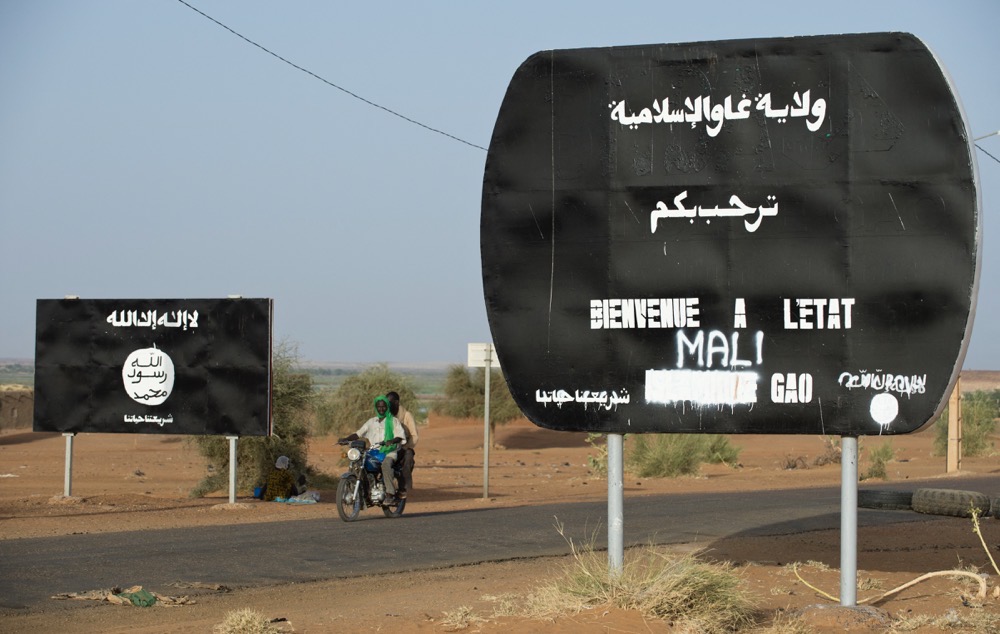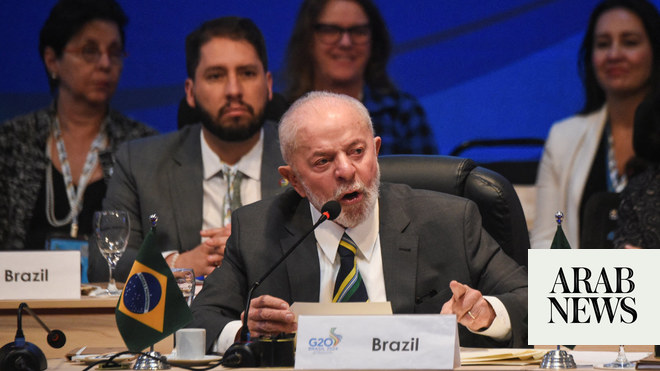N'DJAMENA, Chad: Top UN officials issued a stark warning earlier this month that terrorism and organized crime by violent extremist groups linked to Al- Qaeda and Daesh are expanding as a threat across West Africa and the Sahel region.
This threat is spreading to the coastal countries of West Africa, suggesting that the world may be too late for the emerging crisis.
The statement of Leonardo Simao, the special representative of the United Nations for the Sahel and West Africa, highlighted the increase in the smuggling of drugs, weapons, mineral resources, human beings, and even food.
The first half of 2024 alone saw hundreds of people killed in terrorist attacks, reflecting the escalation of violence.

Members of the military junta arrive at the Mali Ministry of Defense in Bamako, Mali. (AFP)
These developments highlight how complex and multifaceted the challenge is. The intertwining of terrorism with organized crime networks has created a chaotic environment where insecurity is common.
“This instability is also important for the international community. As extremist groups tighten their grip, the humanitarian, economic and political fallout threatens to reverberate far beyond Africa's borders,” said Moustapha Saleh, an Chadian security experts, said Arab News.
The situation is getting worse because of the recent political turmoil. The G5 Sahel, a French-backed coalition meant to coordinate security and development issues in West Africa, collapsed last year after military-ruled countries withdrew from Mali. Niger and Burkina Faso.
This prompted the United States and other Western countries to assist Ghana and neighboring West African countries in strengthening their defenses. Although Ghana, Togo, Benin and Côte d'Ivoire have not yet faced direct violence from the rebels, they have experienced attacks near their borders in recent years, indicating a growing threat. in regional instability.
However, aid to West Africa is not enough compared to the aid given to Ukraine, Ghana's President Nana Addo Dankwa Akufo-Addo said in a recent interview.
US aid to Ukraine since the Russian invasion has risen to $113 billion. In contrast, combined aid from the European Union, the UK and the United States to the Economic Community of West African States, the group known as ECOWAS, amounted to 29.6 million dollars at the same time.

An event held in Menaka, Mali in 2020 aims to reduce the number of weapons in circulation. (AFP)
“Military regimes often struggle with legitimacy and resources, leaving them ill-equipped to deal with the sophisticated and well-financed operations of extremist groups. The lack of international military support has made these countries vulnerable, and the consequences are getting worse,” Saleh said.
This sudden change has opened the floodgates to a wave of extremism as these countries struggle to fill the security vacuum left by the withdrawal of foreign troops.
Many Sahel countries are now turning away from the West in search of partners to strengthen their defenses. The Russian mercenary group Wagner has reportedly been placing contractors and weapons in West African countries, including Mali and Burkina Faso, for the past two years.
The human toll in this growing crisis is staggering. In the first six months of 2024, hundreds of civilians were killed in terrorist attacks. Communities are fragmenting, and immigration is reaching unprecedented levels. Refugee camps swell as people flee violence, so humanitarian aid is essential.
In addition, human trafficking has become a major problem. Vulnerable people are exploited, sold into slavery, or forced into rebel groups. Irregular migration from West African countries to Europe, via regular migration routes, is on the rise.

A vehicle believed to have been set on fire by members of the West Africa Province (ISWAP). (AFP)
At the same time, drug and arms trafficking not only funds extremist movements, but also fuels violence, creating a vicious cycle of instability.
The economic impact is also significant. The proliferation of illegal mining trade, which includes gold, diamonds and other valuable commodities, is depriving the country of significant revenue. Instead of financing development and infrastructure, these resources finance terrorism and crime.
Disruption of normal trade routes due to insecurity has crippled the local economy. Farmers and traders find it increasingly difficult to transport goods, resulting in food shortages and rising costs of living.
“Widespread economic instability discourages foreign investment and hinders development, increasing poverty and food insecurity,” Saleh said.
Since last year, the global support for the fight against terrorism in the Sahel region has been remarkable, with the participation of different countries and organizations. The United States has played a major role, with drone bases in Niger and Burkina Faso and around 1,000 troops in the region.

The military junta took power in Mali on August 19, 2020. (AFP)
France has been a prominent supporter of its military operations such as Operation Barkhane, headquartered in Chad, with approximately 4,000 personnel at its peak. It is designed to protect the region and fight terrorism with local forces in Mali, Niger and Chad.
The EU training mission and the EU capacity building mission were also involved until the wave of coup d'état shook the region. Therefore, Western governments are unable to continue military cooperation with the enemy junta.
But due to the severity of the current crisis, many experts say that the world is unable to look ahead. “The international community must recognize that the threat from the Sahel and West Africa is not limited to the region but has global implications,” Nigerian security expert Souley Amalkher told The Arab News.
INNUMBER
• 361 deaths from conflict in Niger in the first three months of 2024. (ACLED)
• 25.8m+ people in Burkina Faso, Mali, Niger and Nigeria need help this year.
• 6.2m+ displaced people in Burkina Faso, Mali, Niger and Nigeria.
• 32.9m+ People facing food insecurity in Burkina Faso, Mali, Niger and Nigeria.
Terrorism and organized crime in these regions can destabilize entire continents, disrupt global trade, and increase mass migration. “There is also the possibility that these radical ideologies will spread outside of Africa, posing a security threat to other regions,” Amalkher said.
Experts say the spread of extremist ideologies and the presence of terrorist groups in West Africa could lead to instability that could also affect the Arabian Peninsula.
They said that the pro-Western Gulf states, although already supporting counter-terrorism efforts in West Africa, must revise their strategy due to the recent dissolution of the G5 Sahel.

A motorbike passes a sign welcoming people to the 'Islamic State of Gao', which has been changed to 'Welcome to the Malian State', in the Malian city of Gao. (AFP)
Addressing this crisis requires a multi-pronged approach, experts say, pointing to what they say is the need to combine quick and long-term strategies.
“Immediate action should include resuming military cooperation. It is important to restore and strengthen military cooperation with international partners because this will provide the necessary support to local forces to effectively counter the threat of terrorism. It's extreme,” Lauren Mitchel, a security expert from the Washington-based Institute of Peace, told Arab News.
Humanitarian aid is also essential. Rapid and large-scale aid is needed to support the displaced population and provide basic needs such as food, water and medical care.
In addition, there is a need to strengthen border control and international cooperation in disrupting smuggling networks. This includes better intelligence sharing and coordinated law enforcement activities.
Sustainable solutions focus mainly on economic development and supporting projects that encourage self-reliance.

The military junta took power in Mali on August 19, 2020. (AFP)
“This includes building infrastructure, creating jobs and promoting sustainable agricultural practices to ensure food security,” Mitchel said.
Researchers have found that providing youth with education and vocational training can help prevent them from being recruited by extremist groups. Social programs addressing poverty and malnutrition are critical to long-term stability.
They argue that international efforts should be focused on facilitating the transition to a stable government, led by civilians who can manage and respond to the needs of their people.

